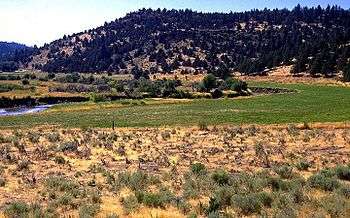Modoc Plateau

The Modoc Plateau lies in the northeast corner of California as well as parts of Oregon and Nevada. It is a mile-high expanse of lava flows with cinder cones, juniper flats, pine forests, and seasonal lakes.[1] The plateau is thought to have been formed approximately 25 million years ago.[2] Nearly 1,000,000 acres (400,000 ha) of the Modoc National Forest lie on the plateau between the Medicine Lake Highlands in the west and the Warner Mountains in the east.
Forested areas of the plateau include Ponderosa Pine (Pinus ponderosa), as well as other tree species such as California Buckeye (Aesculus californica).[3] and Modoc Cypress (Cupressus bakeri).[4]
Fauna
The plateau supports large herds of Mule Deer (Odocoileus hemionus), Rocky Mountain Elk (Cervus canadensis), and Pronghorn (Antilocapra americana). There are also several herds of wild horses on the plateau. The Clear Lake National Wildlife Refuge and Long Bell State Game Refuge are located on the plateau as well.
Watersheds
The Lost River watershed drains the north part of the plateau, while southern watersheds either collect in basin reservoirs or flow into the large Big Sage Reservoir, which sits in the center of Modoc County.
See also
References
- ↑ Sugihara, Neil G. (2006). Fire in California's ecosystems. University of California Press. p. 225.
- ↑ Schoenherr, A.A. (1992). Natural History of California. University of California Press. p. 61. ISBN 0-520-06922-6.
- ↑ Hogan, C. Michael (2008). "Aesculus californica". Globaltwitcher.com. N. Stromberg.
- ↑ "Cupressus bakeri". Gymnosperm database. Retrieved 2011-11-26.
External links
Coordinates: 41°36′N 121°12′W / 41.6°N 121.2°W